Message from the President and CEO 2021
Dedicated to fulfilling our aspiration of
“Eat Well, Live Well.” by providing solutions
for food and health issues
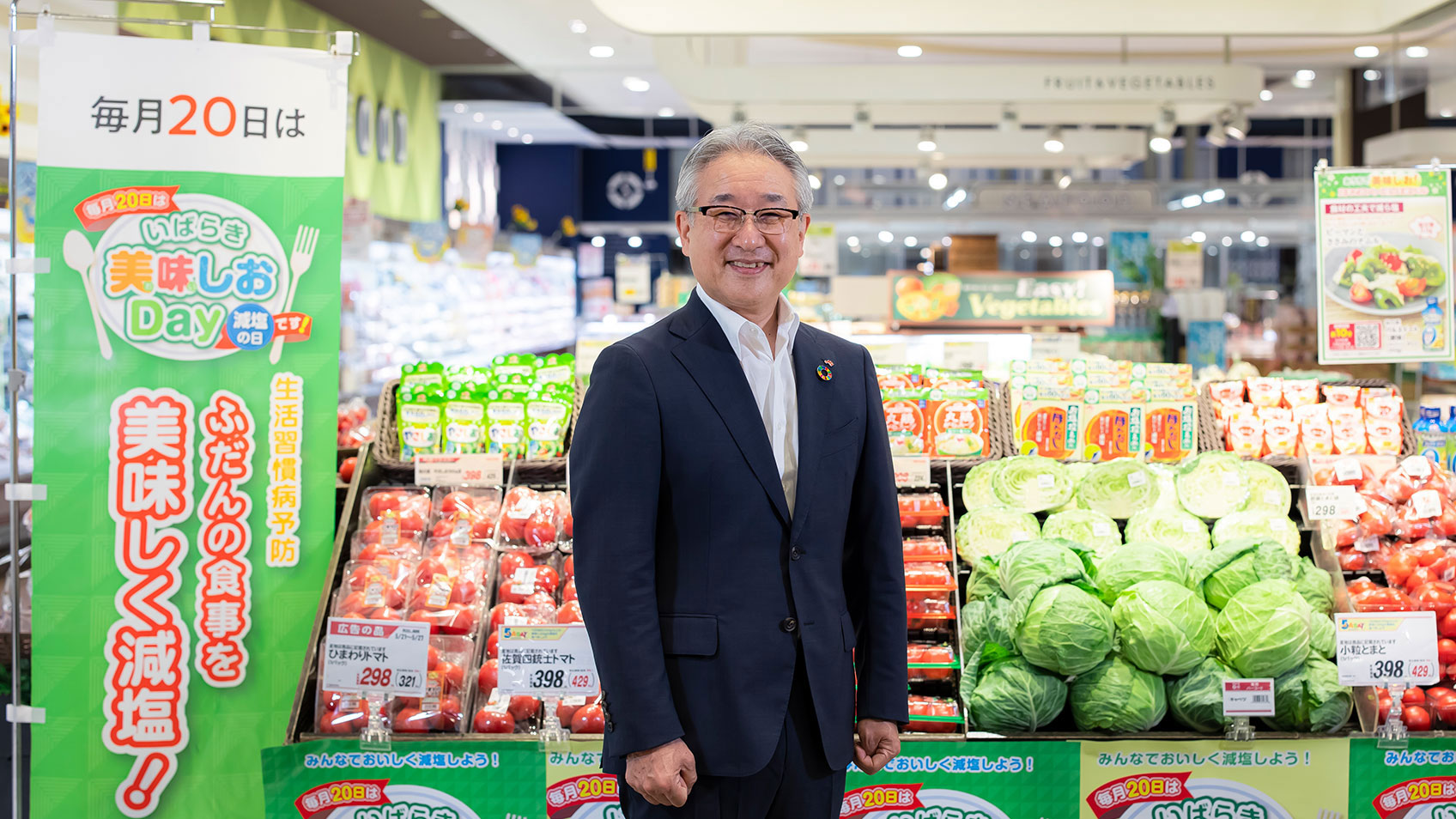
President Nishii visits a supermarket in Ibaraki Prefecture promoting reduced-salt products on the monthly Delicious Salt Reduction Day (Oishio Day) in Ibaraki Prefecture.
Photo courtesy of Food Square Kasumi Aeon Town Moriya
The Ajinomoto Group management philosophy and vision
Overcoming the AND/OR dichotomy in challenging times
The COVID-19 pandemic wreaked havoc on societies and economies around the world in 2020, and the Ajinomoto Group and I myself were no exception. The experience has changed people’s values, and we believe the effects will remain for a long time. As a manager, and personally as well, I feel strongly that we should not approach issues or ideas as having solutions that are exclusive of each other, but that we should seek unity (AND) rather than division (OR). Tensions between countries, ethnic groups, and social classes have always existed all around the world, but the divisions and conflicts have been escalating in recent years. I’m sure that I’m not the only person who is distressed by what has been happening. In his book On Happiness, the early 20th century French philosopher Alain said, “Pessimism comes from our passions; optimism from the will.” As we face the harsh realities of these challenging times, I believe we should do our best to avoid creating divisions (OR) and rather approach situations with a spirit of embracing unity (AND).
Reflecting on the history of the Ajinomoto Group, unity has been an element of our organization since our founding in 1909 when a scientist’s aspiration joined with a businessman’s entrepreneurial spirit. The Ajinomoto Group was created when Dr. Kikunae Ikeda, who discovered that the umami taste derived from the amino acid glutamic acid, partnered with businessman Saburosuke Suzuki II to realize their commitment to “improve the nutrition of Japanese people.” That union of social and economic value lives on in our commitment to ASV (The Ajinomoto Group Creating Shared Value). Likewise, they did not think that delicious and nutritious had to be separate (OR), but formed a clear vision for creating foods that were both delicious and nutritious. Their vision is the main ingredient in our aspiration of “Eat Well, Live Well.” and defines our purpose. This spirit of unification, the AND spirit, is also behind our drive to help resolve food and health issues and contribute to a prospering society and bright future.
Management focused on AND
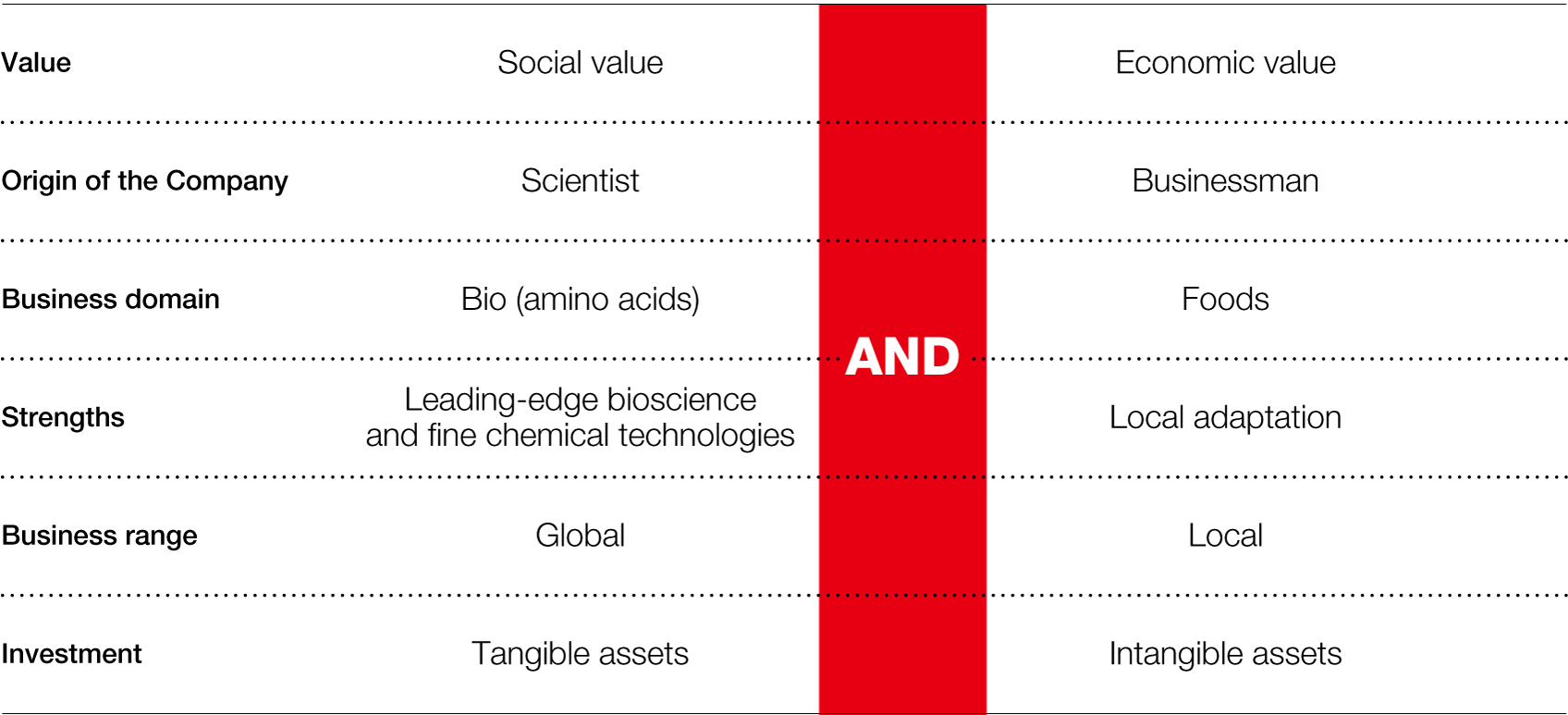
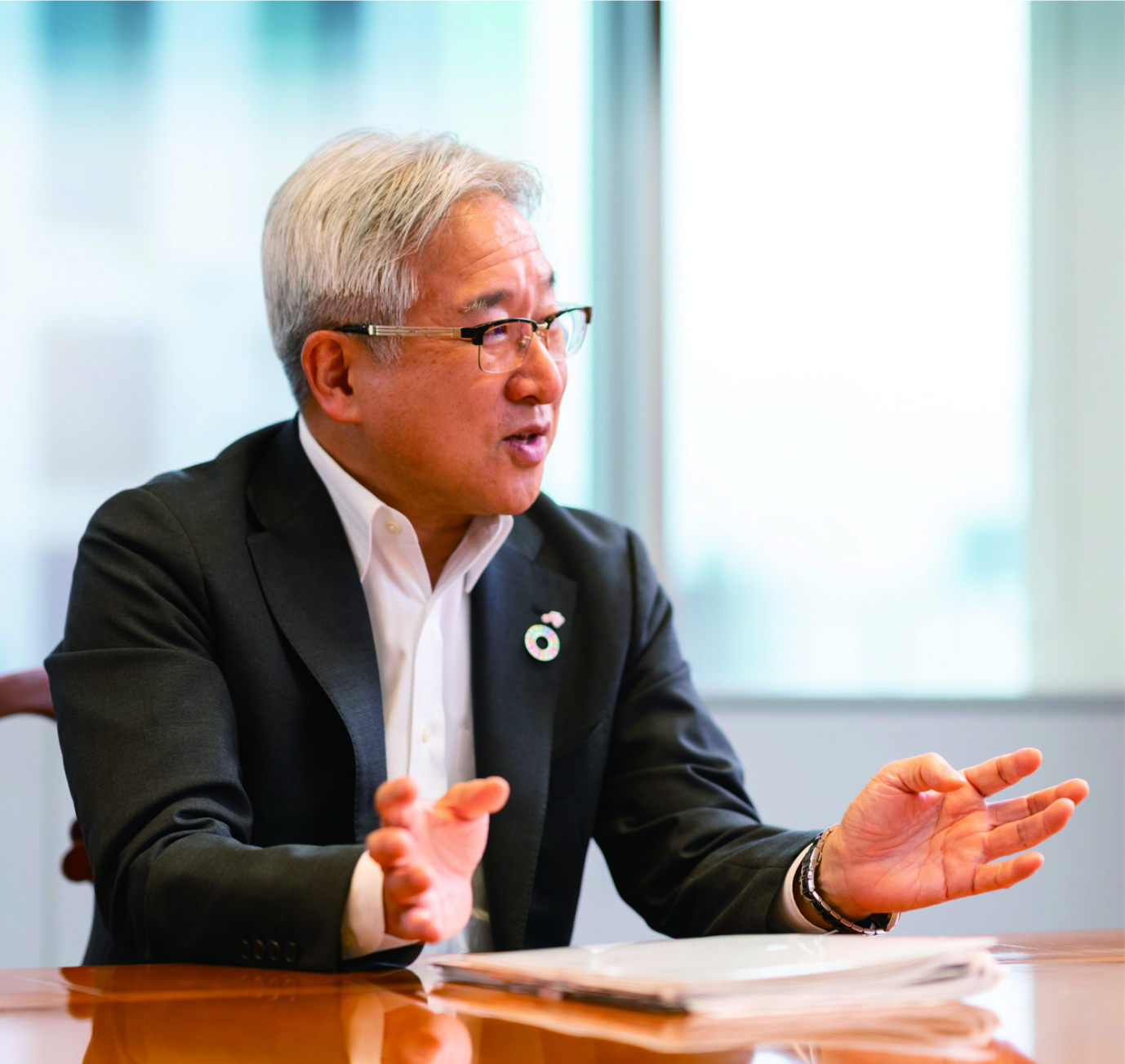
Announcing another step forward in ASV management: The functions of amino acids and building collaboration ecosystems
The objective of ASV management is to guide our businesses in the dual creation of social and economic value. We announced in 2020 that we will transform the Ajinomoto Group into a “solution-providing group of companies for food and health issues” by 2030 to fulfill our open commitment to advancing ASV management. We are seeking two outcomes by 2030—to help extend the healthy life expectancy of one billion people and to reduce our environmental impact by 50%.
Management is applying a policy of “Nutrition Without Compromise” in taste, food access (availability), and local way of life, and the core element for creating value in these areas is the power of amino acids. Protein makes up approximately 20% of the human body, and as much as 50% when excluding the water in our body. Proteins are chains of amino acids, and the Ajinomoto Group has been researching amino acids for over 100 years. Amino acids serve four important functions, including flavoring to make foods tastes good, nutritional to help the body grow and develop, and physiological to help the body function properly. We are applying our leading-edge bioscience and fine chemical technologies to support delicious and nutritionally balanced meals by using functions of amino acids to create delicious foods that are low-salt and promote protein intake. Excess salt intake and insufficient essential nutrients such as protein are worldwide nutritional issues. As the world leader in umami-based seasonings, we believe the Ajinomoto Group can use our strengths in amino acid-related technologies to address both of these issues for the benefit of society and to generate organic growth*1 for the Group.
We are also promoting various environmental measures and objectives as part of our commitment to coexisting with communities and the earth primarily in the areas of mitigation of and adaptation to climate change, development of a recycling-oriented society, and achieving sustainable procurement*2.
Unified action will be essential to achieving these objectives, and we will work within the Group and in collaboration with various stakeholders. Our focus will be in the three areas of clarifying the relationship between diet (nutrition), physical health, and mental health; categorizing eating habits and lifestyles that can lead to lifestyle-related diseases; and establishing an ecosystem of problem-solving activities. We are currently formulating two ecosystems for collaboration in product development and business activities with multiple companies and organizations.
The first ecosystem centers on academia. In April 2020, Ajinomoto Co., Inc. and Hirosaki University launched a research course on the subject of extending healthy life expectancy. The Iwaki Health Promotion Project being conducted by the city of Hirosaki in Aomori Prefecture has been gathering continuous data since 2005 on some 2,000–3,000 items from 1,000 residents that is being used for health-related big data analysis. The Company engages in joint research using the combination of unparalleled health-related big data analysis and the Company’s technologies to analyze the relationship between diet (nutrition) and physical and mental health with the aim of forming and testing hypotheses that will lead to breakthroughs in extending healthy life expectancy.
The second ecosystem will be for finding solutions to health problems. Like the successful Iwate Prefecture Salt Reduction Project begun in 2014, we will pursue opportunities for collaborations with local governments, retailers, and the media in an ongoing cycle of analysis and hypothesis formulation, testing, and verification. In July 2020, we launched the Smart Salt project in which we apply our salt-reduction technology to develop foods under a concept of “delicious, healthy, easy, and new salt reduction” that utilizes umami and dashi broth. We are also excited about expanding the project outside of Japan, and have launched a program in Vietnam.
The Iwate Prefecture Salt Reduction Project showed us that increasing sales of high value-added, low-salt products also lead to a rise in the average unit price. Projects like these therefore have the potential to contribute to the long-term growth of the Ajinomoto Group.
We can then integrate and unite these two ecosystems to widen the circle and expand the activities worldwide through collaboration (AND) with more companies that share our aspirations. We have renewed confidence that we will fulfill our vision for 2030 of helping extend the healthy life expectancy of one billion people, or even more.
*1 Organic growth excludes growth effects from discontinuous items, such as exchange rates, changes in accounting treatment, M&A, and business sales.
*2 Procuring raw materials in a way that supports environmental and social sustainability
Extending healthy life expectancy worldwide
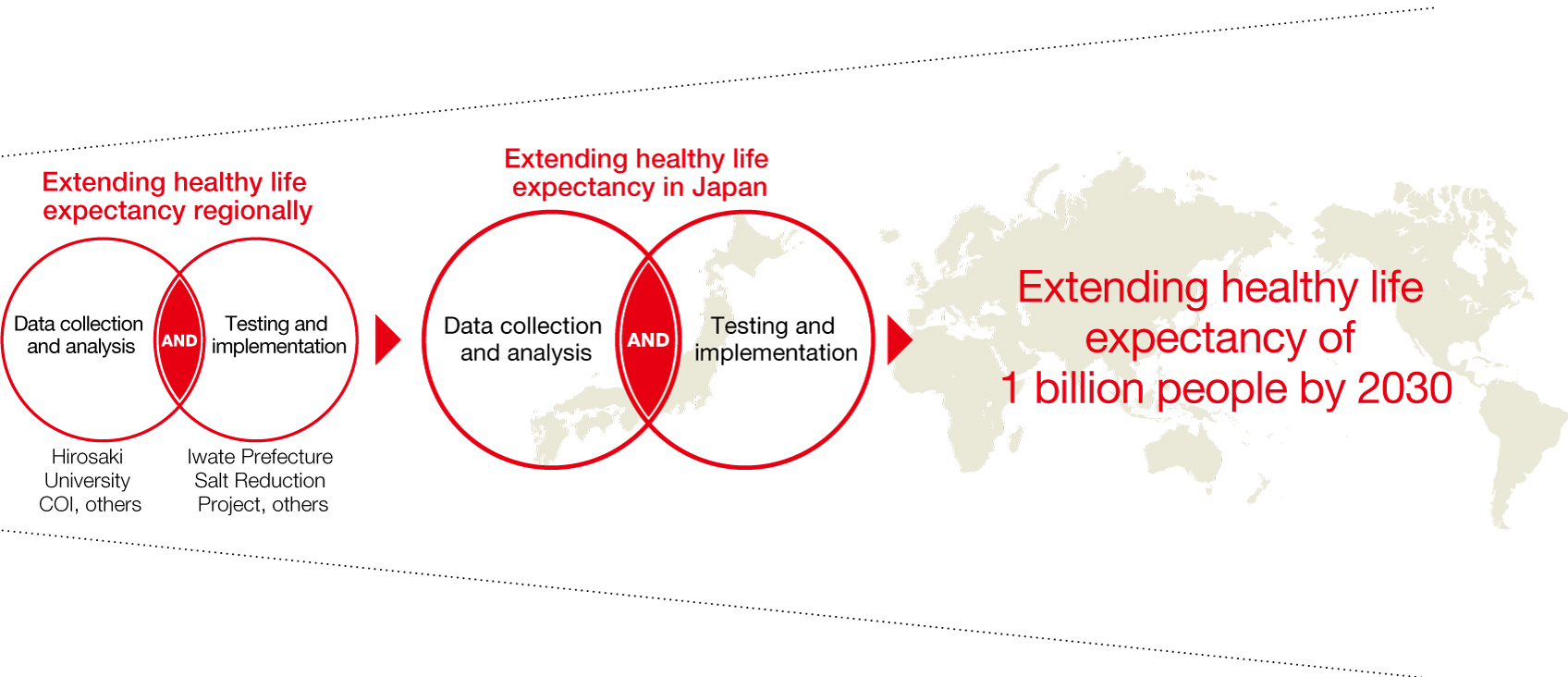
Medium-Term Management Plan progress and performance assessment
Building on the plan’s first year results and addressing the challenges
We are now over a year into our 2020–2025 Medium-Term Management Plan, which we configured by backcasting to the present from our vision for 2030. Rooted in a sense of urgency about the present and future of the Ajinomoto Group, the plan for 2020-2025 is designed to improve the Group’s capital efficiency and reestablish our organic growth. The plan has five explicit financial and non-financial key performance indicators (KPIs) for return on invested capital (ROIC), organic sales growth, core business sales ratio, employee engagement score, and unit price growth (unit price by weight, international consumer products). We are stepping up our activities as described below to achieve these KPIs and aim to exceed our target figures for fiscal 2022. Our performance results for fiscal 2020 and our forecasts for fiscal 2021 are presented in the table below.
Priority KPIs of the Medium-Term Management Plan
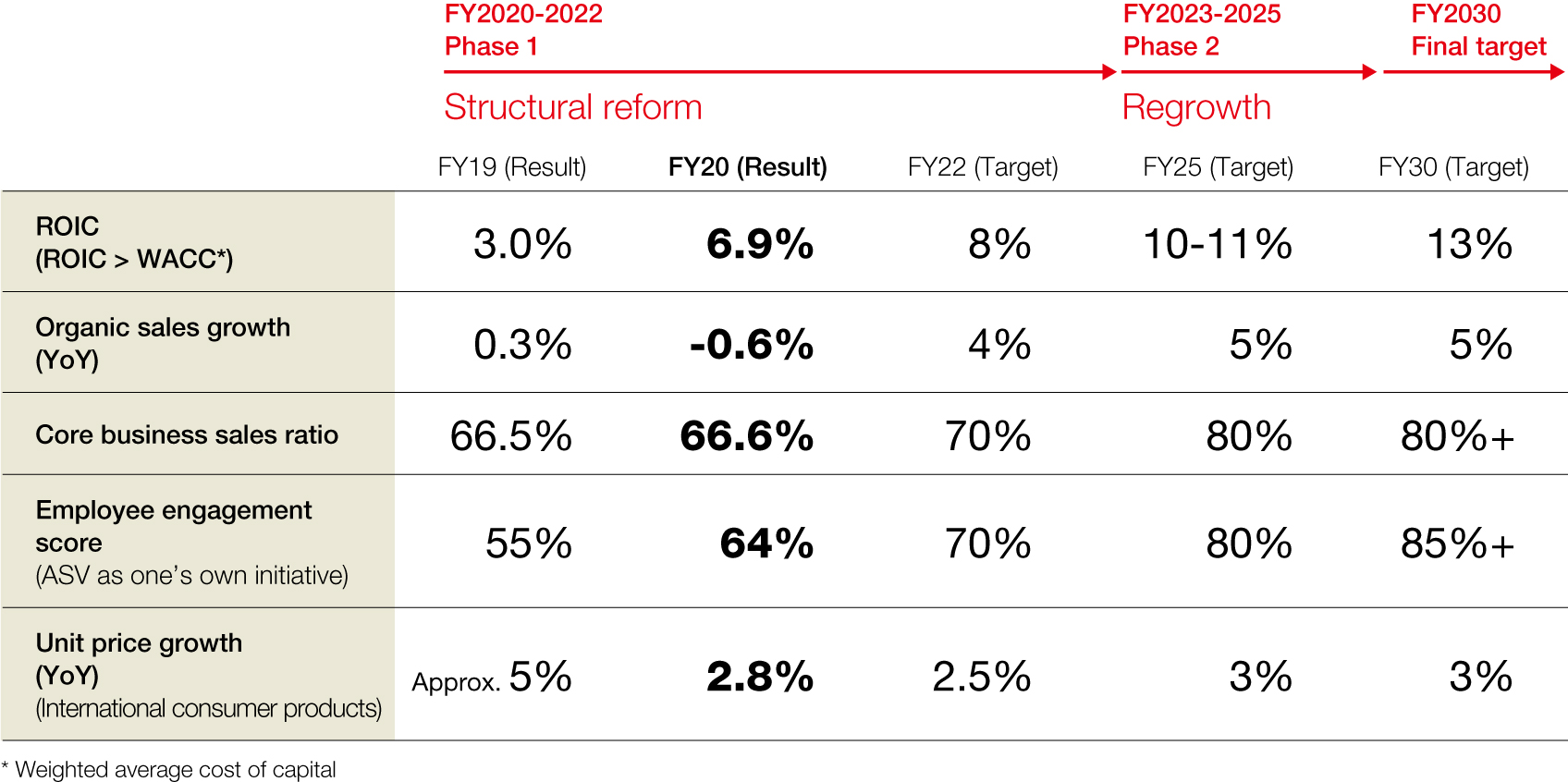
Our performance in the plan’s first year included areas where we progressed faster than expected along with areas where it became clear that we need to give extra attention. We made good progress reorganizing and consolidating our businesses and communicating the Ajinomoto Group Vision to employees. In 2021, we also fortified the corporate governance and sustainability promotion framework that serves as the foundation of our management by creating the new Sustainability Advisory Council in April and converting Ajinomoto Co., Inc. to a Company with Three Committees in June. We also began steadily integrating digital transformation (DX) to all of our “companywide operational transformation” and our “business model transformation.” These activities will take time to produce tangible changes, and we expect the DX to come into full swing and begin producing results in fiscal 2021.
In terms of our business performance, we recorded an all-time high for business profit in fiscal 2020. We take pride that our employees and managers around the world remained dedicated to supporting the food needs of our customers and enabled unceasing operations and sales through the year. Upon seeing the fruits of their dedication and perseverance, I admonish myself for underestimating the power of the Group’s human capital. The business environment for fiscal 2021 still contains numerous uncertainties, but at this point we expect our business performance to improve moderately over the previous year.
Change is unachievable without digital technology
Digital technology is crucial to the Medium-Term Management Plan. One area this is clear is in our shift in management policy emphasis for earnings from short-term profit and loss to ROIC and organic growth. Digital technology tracking and visualizing each business’s KPI in real time, combined with our ROIC tree showing all operations contributing to improving ROIC, will enable us to use time that we have been putting into gathering, tabulating, and analyzing numbers for value creation and problem-solving. We expect the ability to see our KPI progress in real time to also boost employee motivation and lead to higher productivity and employee engagement. In addition, making it easier to see the fundamental aspect of a problem or challenge will allow more people to contribute their expertise so we can more quickly implement effective solutions.
We are presently focusing on raising the digital literacy of our employees as we take a step-by-step approach to applying digital technologies to our internal operations in areas including standardizing managerial accounting, preparing operational guidelines, and promoting operational excellence as the standard management mindset for all of our Group companies.
Transforming our corporate culture
As we implement the Medium-Term Management Plan, we are also seeking to transform our corporate culture through change in five specific ways. The first is revamping the Group Vision. In our aim to increase our contribution to society, last year we revised our corporate vision to “Contribute to greater wellness for people worldwide, unlocking the power of amino acids to resolve the food and health issues associated with dietary habits and aging.” The second is redefining our corporate value. We redefined our corporate value as deriving from our cycle of employee engagement creating customer value (social value) that produces economic value, which then returns to employees and promotes even higher engagement.
The third way is remodeling our human resources development and organizational management. We cannot create new customer value without highly capable human resources. To encourage working closely with customers to find solutions as an organization and on an individual level, we have introduced a mechanism for employees to contribute to corporate value by raising customer value. The fourth is redirecting our management policy on profits. We have moved away from a corporate culture focused on short-term profits and redirected our management approach to a longer-term perspective that emphasizes efficient capital investment and organic business growth.
The fifth way we are transforming our corporate culture is by revising the process for creating business strategy. We formulated business strategies for three and six years in the future by backcasting from our targets for 2030 and factoring anticipated changes in the markets. Although the plans have been carefully prepared, rather than staunchly persisting with them for three years, if conditions change, we understand the importance of periodically revising them to ensure the utmost effectiveness. In fact, we are already revising the three-year plan created in 2020, and will continue to update it each year.
Pioneering spirit and sustainability management
Our biggest challenge is revitalizing our pioneering spirit
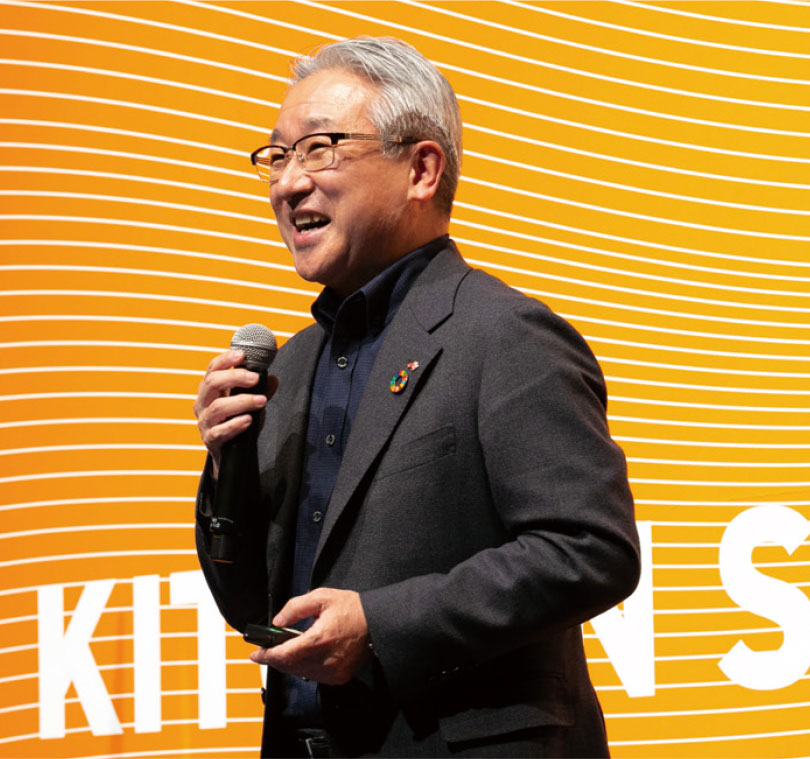
Now that it has been a year since we began transforming the corporate culture, I feel that my mission now is to revitalize the Ajinomoto Group’s original pioneering spirit. In the past year during the COVID-19 pandemic, the 100-plus days that I would usually have spent away from my office on business trips in Japan and overseas were replaced by video conferences, and this format afforded me numerous opportunities to talk with foodtech entrepreneurs from around the world. The lively discussions in these meetings reminded me that the Ajinomoto Group was also a foodtech venture when it was founded in 1909.
We are aiming to extend the healthy life expectancy of one billion people by 2030, but we also need to extend our own healthy life expectancy as a company. As we are now, I have a real concern that new competitors could emerge and disrupt our business model. I believe our strongest defense will be to not rely on precedent and to reclaim the pioneering spirit upon which our company was created.
Last year, we conducted an extensive three-month online training program for 70 of our executive officers and up-and-coming managers. During the meetings, the managers and I talked frankly about the target shortfalls and management issues of past management plans. Everyone also agreed that the vertical organizational structure and the conservative culture clearly need to change significantly. I believe we are making great strides in our transformation, and I vow to our employees and our stakeholders to continue pushing forward.
In fiscal 2020, we also launched the A-STARTERS program to recognize and train entrepreneurs within our ranks so they can be a part of building the Group’s venture capabilities. In this direction, we have also created corporate venture capital (CVC) to invest in venture companies in Japan and overseas. We are also exercising the spirit of unity (AND) by bringing in specialists from outside the company, seeking new collaborations, and forming collaborations and cooperative alliances with various startups. We are moving swiftly and investing substantial amounts to both deepen the Group’s R&D and existing businesses while also (AND) exploring new fields to further our ongoing evolution.
Collaboration and cooperation with startups

Governance system overhaul splits supervision and execution
A pioneering spirit inherently includes healthy risk-taking. In June 2021, Ajinomoto Co., Inc. converted to a Company with Three Committees with the aim of further strengthening the executive supervisory and support functions overseeing our risk-related activities. The Board of Directors guides important management matters from the perspective of improving corporate value over the long term, and supervises the executive side by providing both green and red lights to business activities. The Board of Directors Chair is the outside director, Ms. Kimie Iwata. My role as the Board-appointed CEO on the executive side is to lead the quick execution of activities to fulfill the management direction set by the Board.
Under the new corporate structure, we now have 11 directors, including Audit Committee members. Our outside directors now include Mr. Joji Nakayama, a former CEO of Daiichi Sankyo Co., Ltd., who is deeply versed in the management aspects of the global healthcare industry. This addition has created a 55% majority of outside directors, up from 43% previously when the Company had 14 directors and audit & supervisory board members. Outside directors serve as the chairs of the Nomination Committee, Compensation Committee, and Audit Committee. We have also reduced the number of executive officers from 37 to around 20, to eliminate overlap of duties, clarify responsibilities, and create a younger group of corporate leaders.
In addition, the new Sustainability Advisory Council, which was created in April 2021 and serves under the Board of Directors, is a panel of Japanese and non-Japanese experts who advise the Board of Directors on issues and perspectives from the points of view of health and nutrition, emerging countries, the millennial generation, environmental, social, and governance (ESG) and impact investment, and the media and for a long-term horizon to 2050. The Sustainability Committee, also created in April and serving under the Executive Committee, formulates execution plans and strengthens our management ability to pursue the combined objective of realizing a sustainable society and sustainable Ajinomoto Group.
Sustainability is an endless journey
I enjoy traveling and look forward to going abroad and expanding my horizons. In contrast to a vacation, which usually has a specific destination, I think of the pursuit of sustainability as a journey that will continue forever. While ESG is a means that will bring us to the destination of the Sustainable Development Goals (SDGs), 2030 is merely a transit point. When new destinations are set as we seek to make the world a better place, ESG and the SDGs may become so commonplace that they may even disappear from our vocabulary.
I believe our food system is heading toward a crisis point in 2050, particularly for nutrition and sustainable food supply. The damage could become immutable if the global food industry does not take action now to limit the rise in global temperatures to below 2°C by 2030. The Ajinomoto Group must also continue making every effort to help address environmental and social issues or our own sustainable growth will be in jeopardy. One major issue for the Group is the reduction of greenhouse gas emissions, and we recognize that this entails understanding and cutting emissions throughout the entire supply chain.
We are already monitoring emissions from our company and from our direct raw material suppliers, but it will take several years for us to grasp and improve the actual status of Scope 3 emissions at the suppliers’ sources and on the consumer level. For key raw materials, like palm oil, we are working with the Consumer Goods Forum (CGF)*3, national governments, NGOs, and others to address issues as well as forming procurement guidelines and creating a traceability system.
*3 An industry network of about 400 consumer goods manufacturers and retailers around the world
Always together with our stakeholders
I believe that our ASV management obliges us to not only maintain our good relations with stakeholders in our value chain but to go further and embrace their issues as our own. We commit to our customers and general consumers to provide value to them through foods that contribute to long and healthy lives, to our employees to provide stable employment and a workplace that is rewarding and where they can continue developing their skills, to our business partners to offer fair opportunity, and to our shareholders and investors to pursue sustainable returns and to work to quickly fulfill the objectives of the Medium-Term Management Plan.
By actively engaging with our stakeholders, we will seek solutions to food and health issues and help create a bright future for people around the world, which embodies our aspiration of “Eat Well, Live Well.” We look forward to the continued guidance and support of all stakeholders.
August 2021

Takaaki Nishii
Director, Representative Executive Officer,
President & Chief Executive Officer
Preparing meals gives me a sense of well-being
I enjoy both eating and making delicious food. Since I was a young child, I have always enjoyed helping prepare the numerous traditional dishes for Japanese New Year, many of which I can still make. I enjoy foods from around the world, too, and sometimes spend several days making cured salmon from a recipe I learned from an American chef. Well-being researcher Yoshiki Ishikawa found that countries where men and women have a more balanced participation in meal preparation score higher on a well-being index. The study is motivating me to spend more time in the kitchen, and I’m looking forward to trying the new low-sodium recipes on the website.
website.

